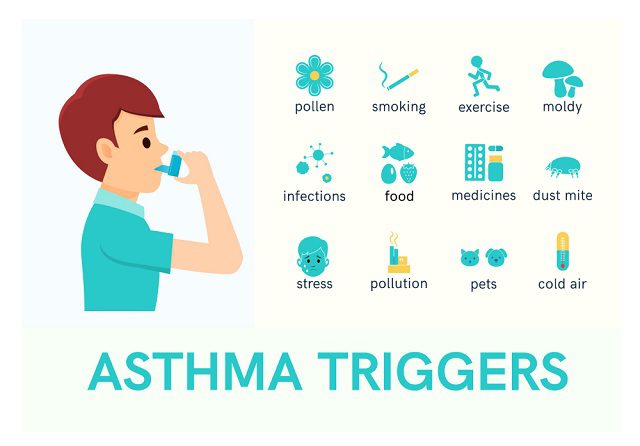Will Shih Tzu Affect My Asthma? Unraveling the Myth
Will Shih Tzu Affect My Asthma? Asthma is a common respiratory ailment that impacts millions of individuals globally. This condition is marked by airway inflammation and constriction, resulting in symptoms like wheezing, coughing, and breathlessness. For those living with asthma, concerns about pet ownership, especially dogs like Shih Tzus, are not uncommon.
In this comprehensive guide, we will delve into the relationship between Shih Tzus and asthma, separating fact from fiction and providing you with the information you need to make informed decisions.
What Is Asthma?
Asthma is a complex respiratory condition that affects the airways, leading to episodes of wheezing, shortness of breath, and chest tightness. It’s characterized by chronic inflammation and heightened sensitivity of the airways, which can result in asthma symptoms when triggered. To evaluate the potential impact of Shih Tzus on asthma, it’s vital to understand the basics of asthma, including its underlying mechanisms and its prevalence among individuals.
Asthma Triggers and Symptoms
Environmental factors, including allergens, irritants, and stress, can trigger asthma symptoms. Recognizing these triggers is vital for individuals with asthma to manage their condition successfully. We’ll explore the common asthma triggers and typical symptoms, such as coughing, wheezing, and shortness of breath, to provide a comprehensive understanding of asthma and its management.

Managing Asthma in Daily Life
Living with asthma can be challenging, but effective management strategies can significantly improve the quality of life for individuals with this condition. In this section, we’ll offer insights into managing asthma daily. This includes medication management, creating an asthma action plan, and making lifestyle adjustments to reduce asthma symptoms and enhance overall well-being.
The Asthma and Shih Tzu Connection
Understanding the asthma and Shih Tzu connection is essential for making informed decisions. While some believe there’s a link between Shih Tzus and asthma, it’s crucial to explore this connection, understand the basis for these concerns, and determine whether there’s scientific evidence to support them.
Dispelling Common Misconceptions
Misconceptions often abound when it comes to Shih Tzus and asthma. Many believe certain dog breeds can worsen asthma symptoms, leading to unwarranted concerns. However, it’s essential to recognize that not all assumptions about Shih Tzus and their impact on asthma hold. We’ll address these common misconceptions and clarify whether Shih Tzus genuinely poses a risk to individuals with asthma.
Meet the Shih Tzu
Before we can assess the compatibility of Shih Tzus with individuals who have asthma, it’s crucial to understand the breed itself. Shih Tzus are beloved for their distinctive personality and appearance. Understanding the Shih Tzu breed is a fundamental step in evaluating whether they can be suitable companions for individuals with asthma.
Shih Tzus are often chosen as family pets due to their friendly, affectionate, and adaptable nature. To determine whether they are suitable companions for individuals with asthma, we’ll explore the appeal of Shih Tzus as family pets. From their loving temperament to their adaptability to different living environments, understanding the qualities that make Shih Tzus popular as companions is essential in the decision-making process.
Responsible breeding practices play a pivotal role in the health and well-being of Shih Tzus. In this section, we will discuss the significance of responsible breeding, the role it plays in reducing allergens and potential asthma triggers, and why it’s vital for ensuring the compatibility of Shih Tzus with individuals who have asthma. Responsible breeding practices contribute to the overall health and disposition of Shih Tzus, making them well-suited for various households.
Strategies for Creating a Healthy Home Environment with Shih Tzus and Asthma
For individuals with asthma who are also proud Shih Tzu owners, it’s crucial to establish a home environment that supports respiratory health. This article explores effective strategies to reduce asthma risks and allergen exposure at home while enjoying the company of your Shih Tzu.
Proper Ventilation
Proper ventilation is a fundamental element of maintaining a healthy indoor environment:
1. Importance of Good Air Circulation: Ensure your living spaces have good airflow. Please consider utilizing ceiling fans or strategically positioned fans to enhance air circulation.
2. Use of Air Purifiers and HEPA Filters: Invest in high-quality air purifiers equipped with HEPA filters. These devices can effectively capture and remove allergens from the air.
3. Ensuring a Well-Ventilated Living Space: Keep windows open when the weather permits, and ensure your home is well-ventilated. Adequate ventilation can help reduce allergen concentration.
Allergen Control
Effective control of allergens is a crucial aspect of asthma management:
1. Minimizing Allergen-Prone Areas: Identify areas where allergens accumulate, such as carpets, curtains, and upholstered furniture. Consider replacing them with allergen-resistant alternatives.
2. Regular Cleaning Routines: Establish a consistent cleaning routine, including vacuuming with HEPA filters, frequent dusting, and cleaning of surfaces. This routine will help keep allergen levels low.
3. Reducing Potential Asthma Triggers: Identify potential asthma triggers in your home, such as mold, dust mites, or pet dander, and minimize their presence.
Allergen-Free Zones
Designating allergen-free zones within your home can significantly reduce allergen exposure for individuals with asthma:
1. Identifying Allergen-Free Areas: Choose specific rooms or zones in your home where your Shih Tzu will have limited access. These areas serve as allergen-free zones.
2. Enforcing No-Pet Zones: Implement strict no-pet zones within your home, particularly in bedrooms and areas where asthma patients spend significant time.
3. Creating Safe and Asthma-Friendly Spaces: Establish spaces where individuals with asthma can find relief from allergens, ensuring their respiratory health is protected.
Pet-Friendly Furniture and Fabrics
Your choice of furniture and fabrics can influence allergen accumulation and asthma risks:
1. Selecting Furniture and Fabrics: Opt for furniture and fabrics that are easy to clean and less likely to trap allergens. Materials like leather or vinyl are good options.
2. Hypoallergenic Bedding and Furnishings for Your Shih Tzu: Invest in hypoallergenic pet bedding and furnishings that resist allergen buildup.
3. Strategies for Minimizing Allergen Contact on Upholstered Surfaces: Implement strategies such as using allergen-resistant covers and regular cleaning to minimize allergen contact on upholstered surfaces.
By implementing these strategies, individuals with asthma can maintain a healthy home environment while enjoying the companionship of their Shih Tzus. A well-ventilated, clean, and allergen-resistant living space is vital to ensuring that both humans and their furry friends thrive together.
Choosing a Shih Tzu When You Have Asthma
Bringing a Shih Tzu into your life when you have asthma can be a rewarding experience, but it requires careful consideration and preparation. In this chapter, we will delve into the essential factors to weigh when selecting the right Shih Tzu for your asthma-friendly household.
Selecting the Right Shih Tzu
Before choosing a Shih Tzu, it’s crucial to understand the allergenic factors associated with this breed:
Evaluating Hypoallergenic Breeds: While no dog breed is entirely hypoallergenic, some are less likely to trigger allergies. Shih Tzus are often considered a hypoallergenic breed due to their low-shedding coat. However, individual reactions can vary, so consider this factor carefully.
Considering Allergen Production in Shih Tzus: Shih Tzus produces fewer allergens than some other breeds, but they still produce allergens through skin cells and saliva. Understanding these allergens is essential to assess the potential impact on your asthma.
Identifying Specific Allergenic Triggers: Some Shih Tzus may produce fewer allergens than others. Consider getting allergy testing for specific Shih Tzu candidates to determine their allergenic profile.
Age Matters
The age of the Shih Tzu you choose can affect allergen production and your overall experience:
Puppies vs. Adult Shih Tzus: Puppies may produce fewer allergens initially, but allergen production can change as they grow. Adult Shih Tzus may have a more consistent allergen profile.
Potential Allergenic Changes with Age: Allergen production can increase as Shih Tzu’s ages. Consider how this may impact your asthma in the long term.
Pros and Cons of Each Age Group: Weigh the advantages and disadvantages of choosing a Shih Tzu at different life stages, considering your immediate and future needs.
Temperament and Compatibility
Assessing the temperament and compatibility of a Shih Tzu is crucial to ensure a harmonious living situation:
Assessing Shih Tzu Personality Traits: Shih Tzu are known for their affectionate and friendly nature. However, individual personalities can vary. Consider the specific temperament of the Shih Tzu you’re interested in and how it aligns with your household.
Compatibility with Your Lifestyle: Determine whether the Shih Tzu’s activity level, energy, and sociability match your lifestyle and preferences.
Interaction with Family Members: Consider how the Shih Tzu interacts with all family members, especially if you have children or other pets. Compatibility with everyone in your household is vital for a positive experience.

Preparing Your Home for a Shih Tzu
Once you’ve chosen the right Shih Tzu for your asthma-friendly household, it’s time to prepare your home to accommodate your new furry family member.
Creating an Allergen-Reduced Zone: Designating specific areas in your home as allergen-free zones can significantly reduce exposure to allergens. In this section:
Designating Allergen-Free Areas: Identify specific rooms or zones in your home where your Shih Tzu will have limited access to reduce allergen exposure.
Using Air Purifiers and Filters: Consider using air purifiers and high-efficiency particulate air (HEPA) filters in allergen-sensitive areas to improve air quality.
Reducing Allergens in the Living Space: Implement allergen-reducing strategies such as regular cleaning, washing pet bedding, and minimizing upholstered furniture.
Pet Supplies and Safety Measures
To ensure the safety and well-being of your Shih Tzu and maintain an asthma-friendly environment, take the following measures:
Selecting Hypoallergenic Bedding and Toys: Opt for hypoallergenic pet bedding and toys less likely to accumulate allergens.
Creating a Safe Space for Your Shih Tzu: Establish a designated area or safe space for your Shih Tzu to eat, sleep, and play.
Implementing Allergy-Friendly Cleaning Practices: Use allergen-reducing cleaning products and practices to maintain a clean and safe environment for you and your Shih Tzu.
Allergen-Reducing Strategies
Implementing effective allergen-reducing strategies is essential to minimize asthma triggers and create a healthier living space:
Grooming and Bathing Your Shih Tzu: Regular grooming and bathing routines for your Shih Tzu can reduce the allergens they produce and carry.
Regular Cleaning and Allergen Control: Implement consistent cleaning routines, including vacuuming with HEPA filters, dusting, and washing pet bedding to reduce allergen buildup.
Professional Allergen Reduction Services: Consider professional allergen reduction services and specialized cleaning to maintain an asthma-friendly environment.
Building a Happy and Asthma-Friendly Relationship
Fostering a positive relationship with your Shih Tzu while managing your asthma is vital for a fulfilling and harmonious coexistence:
Positive Reinforcement and Training: Use positive reinforcement training methods to create a well-behaved and happy Shih Tzu:
Reward-Based Training for Your Shih Tzu: Encourage positive behaviors through rewards and praise, making training a positive and enjoyable experience for your Shih Tzu.
Establishing Boundaries and Routines: Set clear boundaries and establish daily routines that your Shih Tzu can follow, promoting security and comfort.
Promoting Positive Behaviors: Focus on promoting behaviors that minimize asthma triggers, such as avoiding allergen-prone areas or reducing excessive shedding through grooming.
Exercise and Outdoor Activities
Balancing exercise and outdoor activities is vital to a healthy and asthma-friendly relationship:
Managing Exercise to Reduce Allergen Exposure: Choose activities and locations that minimize allergen exposure, such as outdoor walks in allergen-free areas.
Outdoor Adventures with Your Shih Tzu: Explore outdoor adventures and activities you and your Shih Tzu can enjoy without compromising your asthma management.
Creating a Balanced Exercise Routine: Develop a balanced exercise routine that caters to your Shih Tzu’s needs while considering your asthma management requirements.

Family Involvement and Support
Engaging your entire family in the care of your Shih Tzu and asthma management is crucial for a positive experience:
Engaging Children and Family Members: Ensure that all family members are actively involved in the care and well-being of your Shih Tzu.
Educating Family on Asthma Management: Educate your family about asthma triggers and the importance of maintaining an asthma-friendly environment.
Encouraging Responsible Pet Ownership: Instill a sense of responsibility and empathy for pet care and asthma management in all family members.
Choosing a Shih Tzu for asthma involves a thoughtful and thorough selection, meticulous home preparation, and establishing a positive and asthma-friendly relationship with your furry companion. With the proper considerations and measures in place, individuals with asthma can enjoy the companionship and joy that Shih Tzus brings into their lives.
Expert Opinions
Advice from Allergists and Veterinarians
Incorporating expert insights is crucial in addressing concerns related to Shih Tzus and asthma. This section will feature advice and guidance from allergists and veterinarians specializing in allergies and pet care. They will provide professional perspectives on managing asthma while living with Shih Tzus.
Balancing the Needs of Shih Tzus and Asthma Patients
Finding the right balance between the needs of Shih Tzus and individuals with asthma is vital to a successful partnership. This section will explore the strategies and best practices for harmonizing the care and well-being of the Shih Tzu and the asthma patient.
The Importance of Communication and Adaptation
Effective communication and adaptation are central to maintaining a healthy and asthma-friendly environment when sharing your life with a Shih Tzu. This section will emphasize the significance of open communication between family members and adaptation to changes, ensuring the well-being of both Shih Tzus and asthma patients.
Final Thoughts: Will Shih Tzu Affect My Asthma
We will summarize the key takeaways and dispel any lingering myths or concerns regarding the relationship between Shih Tzus and asthma. We’ll present a clear and evidence-based picture of how individuals with asthma can enjoy the companionship of Shih Tzus.
Ultimately, this guide empowers individuals to make informed decisions regarding Shih Tzu ownership while managing asthma. We will highlight the importance of education, preparation, and a positive mindset to create a harmonious environment that benefits Shih Tzus and asthma patients.







